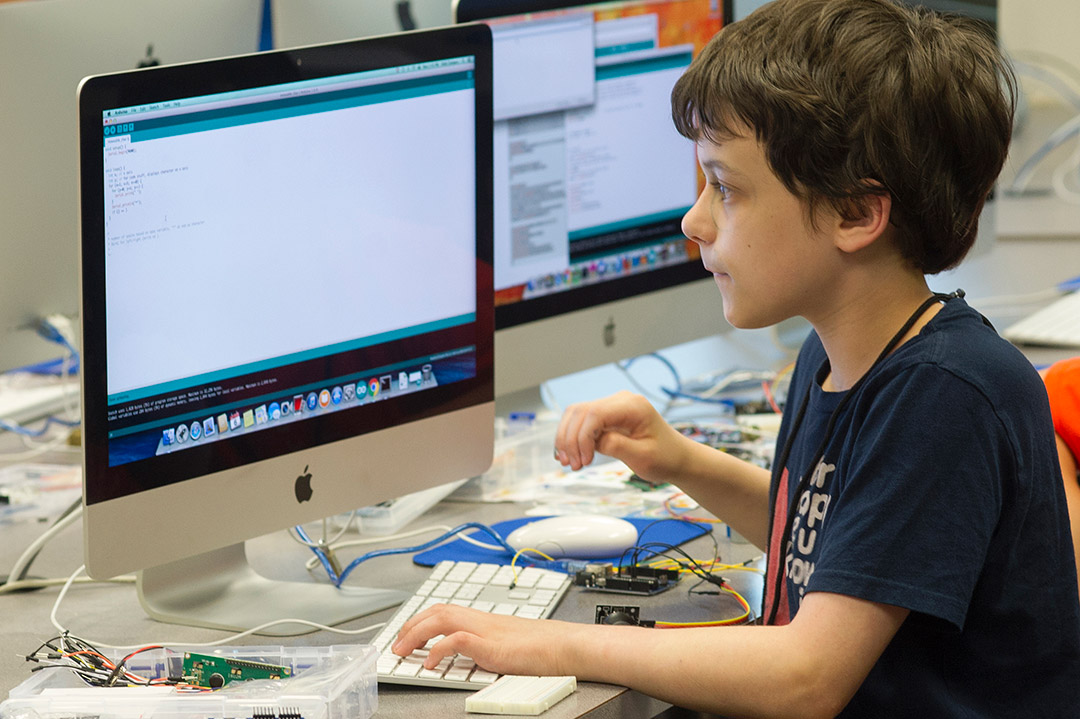K-12 students build skills at RIT summer camps—from cybersecurity to college-readiness boot camp
A. Sue Weisler
RIT is offering a selection of virtual summer camps this year through the K-12 University Center.
Rochester Institute of Technology’s summer day camp programs offer young learners a foray into astrophysics, cybersecurity, energy and the environment, and college readiness.
While RIT’s regular in-person Camp Tiger is on hiatus during the COVID-19 pandemic, RIT’s K-12 University Center is providing select programs via a secure virtual platform through RIT’s Innovative Learning Institute.
The K-12 University Center is also lending support to campus partners who run annual summer camps or who are new to offering outreach programs.
“It’s a combination of new and existing partners putting our efforts, content knowledge, and resources all in one spot to offer the unique opportunities that RIT can provide,” said Kraig Farrell, director of Kids on Campus in the K-12 University Center. “Camp Tiger for this summer has evolved into an even more collaborative entity. We are leveraging our connections and resources within the Rochester community to help our on-campus partners promote their summer programs, and to provide guidance in terms of facilitation or structure.”
Some programs are free to students attending a Rochester City or charter school and include:
- College Readiness Boot Camp for rising 10th-12th grade students;
- Discovering Energy Camp for rising 10th-12th grade students;
- GenCyber Girls Summer Camp for rising 8th-12th grade girls; and
- ROAR Astrophysics Camp for rising 10th-12th grade students enrolled in RIT’s Science and Technology Entry Program (STEP) or Upward Bound.
Additional camp programs open to all students are:
- Gathering Stories: Digital Storytelling free for rising 11th and 12th grade girls;
- Imaging Science Summer Internship free for eligible rising 12th grade students;
- RoboCamp@RIT for 4th-12th grade students, $300 fee (scholarships are available); and
- Students Leading Business Camp for rising 9-12 grade students, $25 fee.
Times, dates and other camp details are listed on the K-12 University Center website.
“The virtual aspect has really forced us to look inward in terms of how we leverage what we have and how we work together to create a network of opportunities for economically disadvantaged or underserved students,” Farrell said. “We use our inroads and connections in the local K-12 community to get these engaging opportunities in front of students, and in turn, help students gain exposure to all that RIT has to offer.”
Constraints caused by the pandemic have enabled the K-12 University Center to apply grant money intended for in-person programs to virtual experiences.
“We have been fortunate to receive support from the Bosch Community Fund, the Shumway Foundation, and the Army Educational Outreach Program (AEOP) to support RIT’s summer efforts to provide STEM (science, technology, engineering, and math) enrichment and college access opportunities to youth within the city of Rochester,” said Donna Burnette, executive director of the K-12 University Center.
The goal is to provide transformative opportunities for the students, Burnette added. “They are able to spend their summer doing meaningful work among like-minded peers and under the mentorship of RIT subject matter experts. Our hope is that this exposure to RIT will help high school summer participants find their college home with us. We are opening the door for future Tigers and building an important knowledge base in the community at the same time.”
During the early months of the pandemic last year, the K-12 University Center had to re-imagine its in-person summer programming and address online safety concerns for students.
Farrell credits Cara Mulvaney, RIT’s new director of Youth Protection and Compliance, for quickly establishing RIT’s policies for virtual youth programs, and Ken Kindler, manager of academic technology systems in ILI, for finding a technical solution to keep the online campers safe. Kindler created “K-12 participant” in RIT’s myCourses online course management system with built-in functions that protect personal information and prevent students from chatting offline or privately emailing each other.
With the virtual platform in place, and Farrell’s experience re-imagining in-person camp programming, he welcomes collaboration with RIT partners interested in exploring K-12 outreach ideas.
“Now, anytime someone wants to provide a virtual outreach opportunity, we already have the platform for it,” Farrell said.













